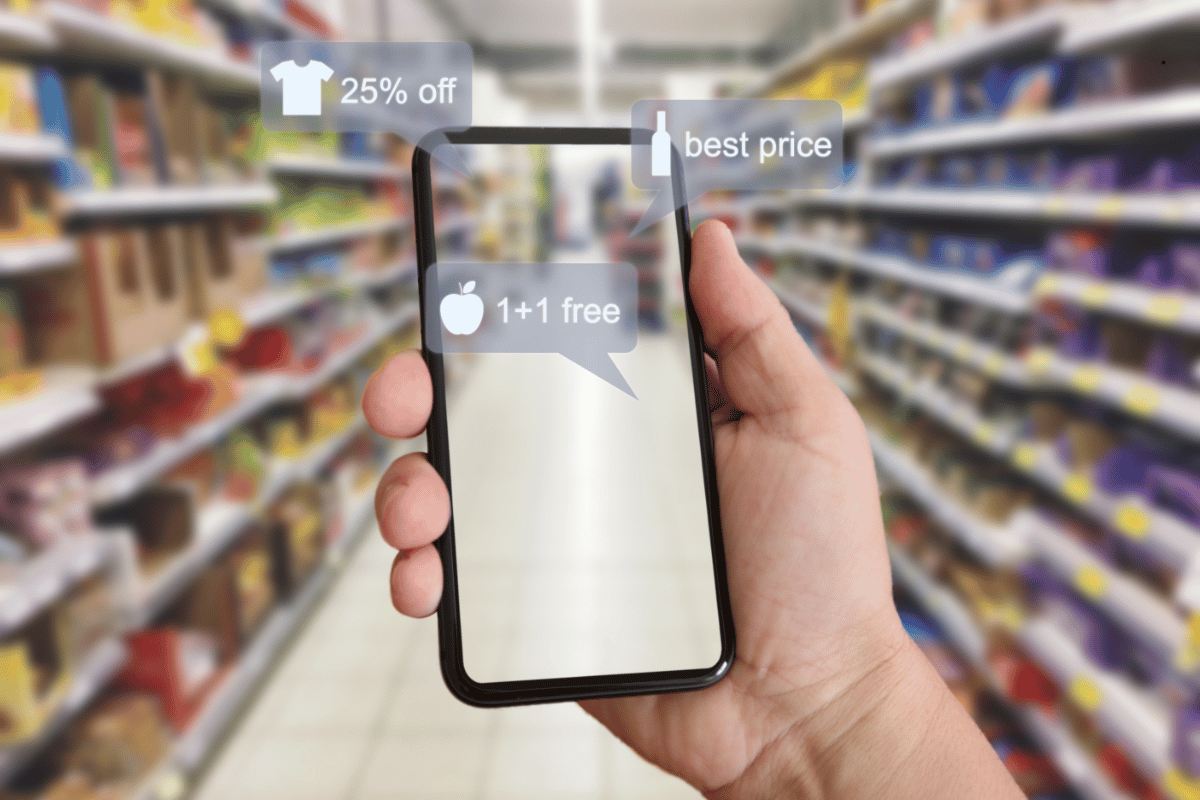AI in E-commerce: Personalizing the Shopping Experience
Did you know, just 7% of clicks on product recommendations account for 24% of the orders? They also bring in 26% of the revenue. It shows how powerful artificial intelligence is in e-commerce. AI makes the shopping experience more personal. This helps shoppers find what they want faster.
AI’s impact in e-commerce is about more than just making things convenient. It looks at how people browse and what they buy. Then, it helps companies engage with customers better. This leads to more loyalty and higher sales. Companies like Salesforce Commerce Cloud are seeing big improvements. After using Einstein Product Recommendations, engelhorn found their online sale rates, order values, and overall revenue shot up.
Key Takeaways
- 7% of visits involving a product recommendation click contribute to 24% of orders and 26% of revenue.
- 52% of consumers may switch brands if communications lack personalization.
- 69% of shoppers expect new merchandise on each visit, emphasizing the need for personalized experiences.
- Engelhorn saw a significant boost in various metrics after implementing AI-driven product recommendations.
- AI-driven personalization enhances customer engagement, loyalty, and conversion rates.
Introduction to AI in E-commerce
Artificial Intelligence (AI) is changing how we shop, online and offline. It helps stores offer a more personal touch to customers. by using AI, businesses can improve how they meet customer needs and run more efficiently.
Understanding AI and Its Role in Retail
AI in e-commerce uses special algorithms and tech like machine learning. It makes shopping better by helping stores manage inventory and predict sales. AI also suggests products or deals to customers based on their personal data, which helps businesses increase their sales.
This technology allows businesses to change prices according to what’s happening in the market or what customers want. It helps them sell more and make more money. AI is also great for handling product delivery better and making sure orders are processed quickly and accurately.
The Need for Personalization in Shopping
Today, it’s essential for stores to recognize each customer individually. Half of all shoppers might go to another brand if they don’t feel special. That’s why AI is so important; it helps stores make each visit unique for the customer.
Using AI to make shopping personal can really pay off. Icebreaker saw a big jump in sales after using AI from Salesforce Commerce Cloud. Similarly, Engelhorn’s online sales and visitor revenue increased significantly. All this shows just how much AI can boost customer happiness and loyalty.
“Among marketers already using AI, 57% say that personalization technology is key to unlocking true 1-to-1 customer experiences across every touchpoint.”
Benefits of AI-Driven Personalization
In the e-commerce world, artificial intelligence (AI) is changing everything. It’s giving customers unique shopping experiences. For companies to keep up, they must understand and use AI’s benefits.
Enhanced Customer Engagement
AI really shines in making customers more engaged. Most people shopping online expect things to be personalized. AI meets those expectations by understanding and serving each customer’s needs. For example, MoEngage helps 1,200 brands reach customers effectively online every month. This shows AI is fantastic at making interactions better by suggesting what each person might actually like.
Boosting Conversion Rates
Another big plus of AI is how it can boost the number of sales. It does this by recommending products people actually want. In a world where 70% of items in online carts are left behind, this is key. Amazon is a great example, using AI to guess what customers might buy. This personal touch makes shopping easier and helps close more sales.
Improving Customer Retention
AI is also making customers stick around. By always showing the right items and experiences, it builds loyalty. Netflix and Starbucks have seen this work. They’ve noticed happier customers who keep coming back. For companies like Walmart, AI helps keep the right amount of products in stock. This makes sure they always have what customers are looking for.
To wrap it up, AI in e-commerce does a lot. It makes customers more involved, gets more sales, and keeps buyers happy. With the e-commerce field expected to grow to $8.1 trillion by 2026, AI is key for success and making customers glad.
AI Technology in Retail
AI technology is making shopping more personalized and smooth. It helps create a digital shopping experience that’s tailored to you. For example, it might show you products you’re likely to love and can afford. This personal touch is key because half of all shoppers are ready to change brands if the messages they get aren’t personal.
Salesforce’s Commerce Cloud Einstein is a great case. A German store called engelhorn used it and online sales went up. They saw a 2.5% jump in people buying things online. The average amount customers spent also went up by 1.5%. And the revenue each site visitor brought in grew by nearly 4%. Icebreaker, a popular outdoor brand, saw big benefits too. They had a 28% increase in sales and people spent 11% more thanks to what Einstein recommended.
Marketers see personalization tech as essential. Fifty-seven percent agree it’s key for making each customer feel special. By looking at what we’ve bought before and what we look at online, AI in *e-commerce* designs websites and ads just for us. This wins loyalty and boosts sales by showing products people are really interested in.
AI is great at stock management too. By predicting what people will want, it helps stores avoid running out or overstocking. This saves money and makes shopping better. For example, we now have smart mirrors and virtual helpers in some stores, making our visits more fun and useful.
In the end, adding AI to online shopping is a win for everyone. It makes things run without a hitch, cuts costs, and gives us stuff we really like. As AI gets better, the ways it helps retail will just keep growing.
AI: Transforming the Digital Shopping Experience
The way we shop online is changing, thanks to artificial intelligence. AI makes shopping more personal by offering products just for you. It uses your browsing history, what you bought before, and what you’re doing now to suggest the perfect items. This is why most shoppers expect to find something new each time they visit a store, online or not.
Curated Product Selections
AI checks out a lot of data to pick the right items for you. This is important, as getting the choices you really like makes you more likely to buy. In fact, nearly a quarter of online orders come from customers who interacted with AI-suggested products. This means AI doesn’t just meet your shopping wishes; it also boosts sales for the sellers.
Data-Driven Customer Insights
AI is also good at knowing what you want before you do. It looks deep into what you and others like you do, helping stores plan how to reach you better. And this matters a lot since over half of consumers might change brands if they don’t get personalized messages. AI helps stores keep you interested by always adapting to what you need.
Also, it makes shopping on your phone even better. Many people use phones when they’re out shopping, and AI can make suggestions then and there. With AI, shops can offer better tips and thus a better shopping trip overall. This way, stores using AI can lead in the market by making shopping both more tailored and more enjoyable.
Personalized Recommendations and Customer Journeys
Personalized recommendations are crucial in creating unique customer experiences. Thanks to AI, brands can suggest items as if you have your own personal shopper.
“Visits where the shopper clicked a recommendation make up just 7% of all visits, but contribute to 24% of orders and 26% of revenue.”
This shows how powerful personalized suggestions are in online shopping. For example, Engelhorn, a big German store, improved online sales significantly. They saw more people buying, spending more per order, and an increase in how much each visitor brought in revenue.
When stores use personal touches, customers are happier. In fact, 52% of shoppers might change stores if they don’t get personal attention. Take Icebreaker, for example. They saw a boost in sales and customer spending by using Einstein’s tools for personalized shopping recommendations.
These numbers highlight how important personalized help and tailored customer journeys are. Businesses need to meet what the customer wants. They should offer experiences just for them to build strong relationships and keep shoppers coming back. As more stores see better customer involvement, support, and sales, the message is clear. Personalized shopping advice is key in today’s online shops.
Machine Learning in E-commerce
Machine learning is changing how online shops understand and meet customer needs. Using smart algorithms, shops can learn a lot from how people search and buy online. This helps them suggest things customers might like, making shopping better for everyone.
How Machine Learning Algorithms Work
Machine learning in e-commerce looks at tons of data. It studies how customers act, where they come from, and what they like online. From this, it spots trends and personalizes shopping suggestions. As the system learns, it gets better at suggesting things people will love and even guesses what they might want next.
Case Studies of Machine Learning Applications
Big names like Amazon, Netflix, and Spotify are leading the way in smart shopping experiences. Amazon uses AI to suggest products based on what you’ve looked at or bought before. This makes shopping easier and more fun. Netflix suggests shows and movies by learning what you enjoy watching. Spotify picks songs you might like by knowing your music taste.
Stitch Fix is another cool example. It picks out clothes that will probably fit your style and budget. This makes finding clothes you love easier. Other brands, like engelhorn and Icebreaker, have also found success with machine learning. They’ve increased sales and won over more customers. This shows the big effect AI can have on online stores.
“AI-powered personalization increases customer engagement by up to 74% and can lead to a 40% increase in customer spending.”
These achievements highlight how machine learning is crucial in online shopping. They show us the amazing things AI can do for both customers and businesses.
Real-Time Data Integration
Real-time data integration is key in today’s e-commerce, changing how companies work and connect with their buyers. It lets AI enhance product suggestions and sales tactics using the latest interactions. This makes sure recently gathered data is used for better advice and strategies.
Thanks to real-time data integration, online stores can instantly change based on what customers want. This gives buyers a shopping experience that fits them personally. For example, personalized recommendations are very important for 67% of first-time shoppers. So, instant changes not just meet but beat customer hopes.
Pulling data from many sources helps companies adjust their marketing steps. AIs make it possible to send messages and promos made just for the buyer. This makes shoppers happier and keeps them engaged. Little surprise, almost 82% of firms are using AI to better their online interactions.
Also, using live data keeps businesses ahead by setting better prices and managing stock smarter. With the world spending over $8 billion on AI in e-commerce by 2024, using data quickly becomes very important.
To sum up, real-time data integration is vital for today’s online shops. It boosts AI-powered customization and gives shoppers a better, quick shopping experience everywhere.
AI-Powered Chatbots and Virtual Assistants
AI chatbots and virtual assistants have changed the game for e-commerce. They make customer support way better. Businesses now give fast, personal help and quick answers thanks to AI. This makes shopping online a lot more enjoyable, keeps customers coming back, and helps them trust the brand.
Enhancing Customer Support
AI chatbots make customer service smoother and quicker. They can do many things, like track orders and give info, all day and night. They are perfect for businesses with customers all over the world. According to Gartner, they cut down on incoming questions by up to 70%. And 74% of people online say they like using chatbots for simple questions.
Facilitating Seamless Shopping Experiences
Virtual assistants are key in making online shopping easier. They help customers find what they want more easily. This really reduces the number of times people put stuff in their cart but don’t buy. They can also recommend similar products, which makes the business more money. As these AI tools learn more, they keep getting better at helping customers, which makes shopping more fun and satisfying.
Using AI for analytics can help businesses predict what customers will want. This means they have just enough stock, so they don’t run out or have too much. It makes everything smoother, cheaper, and helps customers get what they want when they want it. So, AI is not just good for shoppers but for businesses too.
Source Links
- https://www.salesforce.com/products/commerce-cloud/resources/personalized-shopping/
- https://www.forbes.com/sites/forbestechcouncil/2023/04/21/how-e-commerce-brands-can-use-ai-to-deliver-a-more-personalized-shopping-experience/
- https://www.forbes.com/sites/rhettpower/2024/05/12/next-level-ecommerce-ais-secret-weapon-for-personalized-experiences/
- https://www.bigcommerce.com/articles/ecommerce/ecommerce-ai/
- https://influencermarketinghub.com/ai-personalization-ecommerce/








